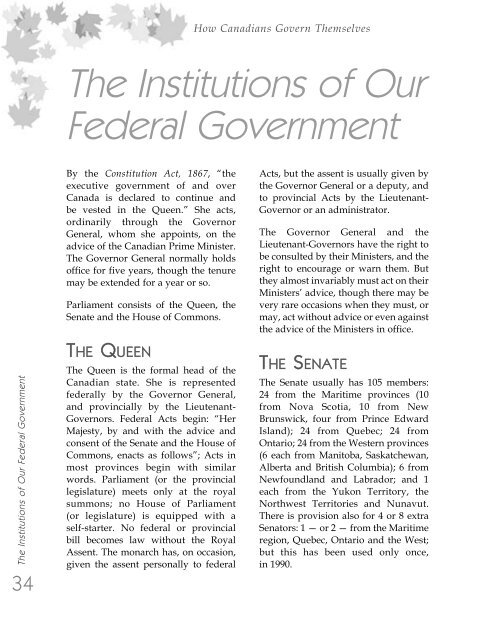How Canadians Govern Themselves - Parlement du Canada
How Canadians Govern Themselves - Parlement du Canada
How Canadians Govern Themselves - Parlement du Canada
You also want an ePaper? Increase the reach of your titles
YUMPU automatically turns print PDFs into web optimized ePapers that Google loves.
<strong>How</strong> <strong>Canadians</strong> <strong>Govern</strong> <strong>Themselves</strong>The Institutions of OurFederal <strong>Govern</strong>mentThe Institutions of Our Federal <strong>Govern</strong>ment34By the Constitution Act, 1867, “theexecutive government of and over<strong>Canada</strong> is declared to continue andbe vested in the Queen.” She acts,ordinarily through the <strong>Govern</strong>orGeneral, whom she appoints, on theadvice of the Canadian Prime Minister.The <strong>Govern</strong>or General normally holdsoffice for five years, though the tenuremay be extended for a year or so.Parliament consists of the Queen, theSenate and the House of Commons.THE QUEENThe Queen is the formal head of theCanadian state. She is representedfederally by the <strong>Govern</strong>or General,and provincially by the Lieutenant-<strong>Govern</strong>ors. Federal Acts begin: “HerMajesty, by and with the advice andconsent of the Senate and the House ofCommons, enacts as follows”; Acts inmost provinces begin with similarwords. Parliament (or the provinciallegislature) meets only at the royalsummons; no House of Parliament(or legislature) is equipped with aself-starter. No federal or provincialbill becomes law without the RoyalAssent. The monarch has, on occasion,given the assent personally to federalActs, but the assent is usually given bythe <strong>Govern</strong>or General or a deputy, andto provincial Acts by the Lieutenant-<strong>Govern</strong>or or an administrator.The <strong>Govern</strong>or General and theLieutenant-<strong>Govern</strong>ors have the right tobe consulted by their Ministers, and theright to encourage or warn them. Butthey almost invariably must act on theirMinisters’ advice, though there may bevery rare occasions when they must, ormay, act without advice or even againstthe advice of the Ministers in office.THE SENATEThe Senate usually has 105 members:24 from the Maritime provinces (10from Nova Scotia, 10 from NewBrunswick, four from Prince EdwardIsland); 24 from Quebec; 24 fromOntario; 24 from the Western provinces(6 each from Manitoba, Saskatchewan,Alberta and British Columbia); 6 fromNewfoundland and Labrador; and 1each from the Yukon Territory, theNorthwest Territories and Nunavut.There is provision also for 4 or 8 extraSenators: 1 — or 2 — from the Maritimeregion, Quebec, Ontario and the West;but this has been used only once,in 1990.




